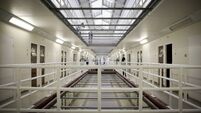Ireland will 'only just avoid' recession in 2023, says McGrath

Micheal McGrath: 'We are not immune from the threat internationally but we can weather the storm.'
Ireland will only just avoid recession in 2023 amid significant “downside risks” to the economy, Finance Minister Michael McGrath has said.
With talk of the eurozone going into recession, Mr McGrath said uncertainty over the war in Ukraine, a weakening demand for Irish goods, and an EU-wide policy of dampening inflation present risks to Ireland.














